- Home
- Julia James
Painted the Other Woman Page 5
Painted the Other Woman Read online
Page 5
He was taking a gamble here. Athan knew that. Chekov might be the last thing to persuade her. But his surveillance records indicated that she had spent numerous evenings at the theatre, and that included any number of high brow plays. Tickets for the upcoming Chekov were like gold dust, and might be sufficient temptation for her.
Marisa could only stand there. Her heart rate seemed to have quickened, and thoughts were racing through her head.
He’s trying to pick me up—he’s definitely trying to pick me up. Asking me to the theatre is a pick-up—no question about it! No ambiguity or misunderstanding like it was about the coffee machine—just a plain straightforward date to go to the theatre together …
A strange kind of thrill went through her, but there was a tremor in it too. Thanks to the remoteness of her childhood home, the difficulties of her upbringing with her lonely, isolated mother, she had little experience of men. She knew she had the kind of looks they liked, but her mother had considered her beauty more of a danger than a blessing—just as her mother’s looks had proved a danger to her when she’d been young, Marisa thought sadly. It had taken Ian’s open admiration for her to let her blossom finally. His insistence that she indulge herself in beautiful clothes and lavish beauty treatments had finally convinced her that it was OK for men to find her attractive.
Even, she accepted, with another little thrill, this devastatingly gorgeous man, standing here inviting her out for the evening.
Of course it was unquestionably out of the question. It had to be. She couldn’t go on a date with a strange man just because he happened to live—very temporarily—next door to her. Good grief, she didn’t even know his name. Only that he was rich. And Greek.
And irresistibly good-looking …
And that combination makes a male that assumes he’s going to get his own way, my girl! So you know perfectly well what you’re going to say, don’t you? You’re going to smile, a small, tight little smile and step backwards, to convey the right body language, then say, politely but adamantly, No, thank you. And you are going to close the door and not have anything more to do with him. That’s what you’re going to do.
She opened her mouth to do just that. Which meant that it was incredibly, unbelievably annoying when what she heard her voice saying was, ‘Is that that new production of Three Sisters that I’ve read about in the papers?’
‘That’s the one. Would you be interested?’
Marisa swallowed. Yes, she would be interested. Anyone who loved the theatre would be. She’d seen it advertised and it had a stellar cast, including a Hollywood star keen to make her mark as a classical actress.
But was that any reason to accept what this complete stranger had just offered?
She must have made her hesitation apparent, because before she could say anything more, he spoke again.
‘Perhaps,’ he said, and his voice had changed slightly, as had the expression in his eyes, though she wasn’t entirely sure how, ‘it might be timely at this juncture to reassure you that I am not, as you may possibly be currently wondering, either a murderer, a burglar, a spy or wanted for questioning by Interpol. I am, for my pains, merely a businessman, and tediously respectable … ‘
There was a mix of humour and frankness in his voice, and as he spoke he reached a long-fingered hand inside his jacket pocket and withdrew a silver card case, flicking it open and withdrawing one of its contents, proffering it to her with another of those quick, quirking smiles that seemed to have such a powerful effect on her in disproportion to their duration.
She found herself taking the card, staring at it. It was written in Latin script and it said simply, ‘Teodarkis Holdings’. There was a Mayfair address, and a discreet name in the corner: Athan Teodarkis.
Athan watched her peruse the card. There was a lot riding on her reaction. A whole, game-changing lot. He was taking the gamble that Ian had never mentioned the name of his wife’s family to her, or the company that owned the one he worked for himself. As he studied her face he could see nothing that would indicate, even under high-focus scrutiny, that it meant anything to her at all. He could feel relief rippling through him.
He gave her a moment or two to study the business card, then addressed her again.
‘Does that convince you I am totally harmless?’ he asked.
There was a touch of light humour in his voice, and she let her eyes glance up at him from the white card in her fingers.
Harmless? The word reverberated in her head. Harmless? As she looked straight at him, at his breathtaking dark good-looks, the word seemed to mock her.
‘So,’ he was saying, ‘will you come? I hate going to the theatre on my own.’
‘Surely there must be someone you already know that you could invite?’ she countered. There was just a trace of acidity in her voice, because a man like this, who was the very last man any female would ever describe as ‘harmless’, must have a very long list of women who would drop everything for a date with him.
‘No one who likes Chekov,’ he responded promptly. ‘He’s not to everyone’s taste.’
Hmm, thought Marisa, for not ‘everyone’ read ‘the kind of high-maintenance glossy woman whose idea of a hot date with a man like him would not be a play by a nineteenth century Russian dramatist about a bunch of gloomy, indecisive provincials who drifted about aimlessly and got depressed’.
‘And you think I would?’ she challenged, suddenly and illogically stung that he clearly did not consider her the kind of female he usually asked out. ‘Is that your reason for asking me?’ she said pointedly.
Long lashes dipped down over gold-flecked eyes. ‘Part of it,’ he agreed.
The dark eyes rested on her, conveying their message. A message that told her that whatever she might have thought about not being the kind of woman he usually asked out, she had, in fact, been mistaken …
There was something new in his voice—something that told Marisa this was a very experienced operator indeed. For a second panic beat in her throat. She was out of her depth—way, way out! Oh, he might be seeing a woman living in a luxury apartment, dressed in designer clothes and looking svelte and groomed, but she knew that beneath that glossy surface she was only a raw country girl. Even her short time with Ian couldn’t eradicate that.
She suddenly realised he was speaking again.
‘Well—have I persuaded you?’ There was nothing more than the familiar quizzical enquiry in his voice, his expression.
Marisa swallowed. ‘Um … I—I … ‘
He smiled. The full on smile that changed his face, turned her insides out, parted her lips and made her stare gormlessly at him.
‘Great. OK—so, can you be ready by seven?’
‘Um—’
‘Good girl,’ he said approvingly, as if she’d agreed to his invitation. He made as if to step away, then suddenly paused, as if something had just struck him. ‘I’ve just realised,’ he said, and there was self-reproof in his voice, ‘I’ve absolutely no idea what your name is.’
He made the omission sound like a cause for humour, not an indication that she was a complete stranger to him. He looked at her expectantly.
There was a strange sensation in Marisa’s head. As if everything that was going on was completely, totally unreal. Then, as if in a haze, she said slowly, ‘It’s Marisa—Marisa Milburne.’
The long lashes swept down again. Then, before she had the faintest inkling of what he was about to do, she felt, of all things, her hand being taken, and lifted.
‘I’m delighted to make your acquaintance, Miss Milburne,’ he murmured, holding her wide-eyed gaze.
Instantly she held her breath, and he inclined his head and kissed her hand.
It was fleeting, it was momentary, it was over in a second, but it left her bereft of rationality.
‘To compensate for the informality of our acquaintance,’ he murmured.
Then, with a final stomach-dissolving smile, he turned and headed down to the lift. Marisa stared, inca
pable of movement, until the doors had opened, then closed again, shutting him off from her view. Then, very slowly, in a total daze, she went back into her apartment.
Inside, she stood, staring at her hand for several seconds, bereft of both speech and all rational thought.
Least of all any sense of danger …
CHAPTER TWO
‘WELL, what do you think? Should she stick to Hollywood?’
The curtain had fallen, and Marisa was making her slow way out of the stalls. Athan Teodarkis’s tall presence behind her was almost tangible as he followed her. But then it had been tangible the entire evening. Tangible even when he’d been on the far side of a taxi seat from her on the way to the theatre, let alone when he’d been sitting right next to her in the plush stalls seat, his sleeve almost brushing hers, even though she’d tried to make sure she kept her hands in her lap, not resting on the chair arm like he had.
A hundred times she’d told herself that she should never have accepted his invitation. That it was completely unacceptable to have done so, and a big, big mistake.
She didn’t know the man. Didn’t know him from Adam. However prestigious a business card he possessed, he was a stranger—a stranger who had quite blatantly picked her up. Not quite off the street, but even so—being some random guy in the flat next to hers was not exactly a formal introduction, was it? But the moment she thought about the total absence of any kind of formal introduction the memory of that hand-kiss was there, and the fleeting sensation of his lips scarcely brushing her knuckles …
No wonder Victorian maidens swooned when men kissed their hands!
How, she wondered for the millionth time, could such a formal gesture be so incredibly … intimate? For intimate was the only word for it. And swooning the only word for the sensation it had created … ?.
The sensation that permeated her still. Not quite as intense, but there all the same, like a very low-level fever that had been running in her veins constantly, all evening. She’d sought to ignore it, sought to make herself behave with this man as if he weren’t having that effect on her, as if it were perfectly normal to make polite, anodyne conversation about the play, the theatre, the state of London traffic, sounding composed and unaffected and sensible.
She’d deliberately dressed in a style that was demure—there was no better word for it. No way was she going to give him the slightest reason to think she was coming on to him! Either by her manner or her appearance. So the grey light wool dress she’d chosen was smart, no doubt about that, and had a mid-range designer tag, but the neckline was not low and the cut was quite loose, its hemline touching her knee. Matching grey tights and grey low-heeled shoes went with it, and the only jewellery she wore was a metallic haematite necklace. Her hair was dressed in a plaited coil at the back of her head, and her make up was as discreet as the rest of her.
Had he looked very slightly surprised at the overall demureness of her appearance? She wasn’t sure, but if he had the look had disappeared immediately, and his manner towards her had mirrored her own. He was courteous and conversational, but he was not coming on to her—to her relief.
It was to her relief, wasn’t it? She was glad he was simply talking to her as if she were, say, the wife of a friend or a colleague, or even a middle-aged woman. Because of course she wouldn’t want him to talk to her as if she were a female he found attractive or wanted to make up to, would she?
Of course not, she told herself firmly. So, keeping that clear in her mind, she answered now, as they made their way into the foyer, ‘I thought she was pretty good all round. At first I kept only seeing her as a “star,” but after a while I just saw her as her character, and I thought she did it better than one might have expected.’
‘Interesting,’ he commented, ‘that she took the role of the oldest and dowdiest sister—when her Hollywood parts are always so glamorous.’
‘I expect she thought it was the most challenging part,’ she answered lightly. ‘Playing against type.’
His response was ‘Yes, very probably,’ and then he made a comment about another of the cast. As they walked out onto the pavement, the chilly air hitting her, he guided her towards the left.
‘I do hope,’ she heard him say, ‘that you will agree to having a post-theatre dinner with me? I find that an evening performance is never best timed to eat either before or after.’
She felt her arm being taken. Not in a possessive way, let alone in any kind of intimate way, but simply lightly, cupping her elbow to guide her along the pavement. Guiding her where he wanted her to go.
For a moment she felt she ought to refuse, then she gave a mental shrug. She was hungry, and since she’d already gone to the theatre with him what harm would there be in going on to a restaurant? Besides, she wanted to talk about the play, and if she just went home there would be no one to talk to.
There never was, apart from Ian.
A pang went through her but she thrust it aside. She was lucky—beyond lucky!—to have Ian in her life now, and as for making friends in London—well, that was entirely up to her. She would volunteer for a charity, start up exercise classes, possibly evening classes as well—why not? And she’d soon have friends here—of course she could. She had a brand-new life, courtesy of Ian, and she would make the very most of it.
The restaurant Athan Teodarkis took her to was only a short walk from the theatre. It wasn’t, she was glad to see, either a very crowded, popular one, or a quiet, intimate one. There were a fair number of other diners there, but the lighting was not conducive to romantic dining à deux, and she felt reassured. Post-theatre seduction was evidently not, thank goodness, on her escort’s mind.
All that was on his mind, it seemed, was ordering from the menu, choosing wine, and then being perfectly prepared to discuss the production they’d just seen.
‘I have to admit,’ he opined, having nodded to the sommelier to fill their glasses and taken an appreciative mouthful of the wine, ‘that the play did irritate me in respect of the sisters’ endless preoccupation with wanting to go to Moscow but never going. I kept finding myself wanting to shout Just buy a train ticket!’
Marisa gave the requisite smile in response, but then said ruminatively, ‘But if you’re not used to travel, and you’ve always lived in one place, then going to a big city can be very daunting.’
Athan’s eyes rested on her a moment. ‘You sound like you speak from experience?’
‘Well, yes, I do. Up until recently I’d never left Devon. It sounds odd, in this day and age, but I’d never been to London.’ It was an admission she suddenly felt unsure about making, as if revealing it might put him off her. But it didn’t seem to.
‘What made you come here?’ His voice was neutral.
She gave a little shrug. ‘Oh, wanting to see the bright lights and so on. Usual reasons, really.’
The nonchalance in her voice did not deceive him. Yet he found himself unable to decide what was the cause of it. On the most cynical interpretation it could be, a blithe glossing over of an ambition to come up to London and catch the attention of a wealthy man … just as she had with his brother-in-law. But he had to acknowledge it might also be, simply because she felt that being seen as a country girl didn’t go with her sophisticated image.
Not that she was presenting a sophisticated image tonight, he also had to acknowledge. He’d been unable to suppress a flicker of slight surprise when he’d first set eyes on her and taken in her outfit for the evening. Demure had been the word that came to his mind, and it was an odd one for a female who was happy for a married man to lavish his money on her.
Once again he felt a flicker of emotion go through him. He was glad she hadn’t taken the opportunity to dress to kill this evening, to attempt openly to wow him. Instead, the fact that she was playing down her natural beauty was, he realised, really quite appealing …
He made another comment about the performance, drawing another response in kind from her, and by the time their first course arrive
d he was aware that he was, against his expectations, enjoying talking to her. Her views were intelligent and informed, and she revealed a sensitivity to the play’s characters’ various dilemmas that showed she understood the complexities of their situations—even that of the sisters’ feckless brother.
‘I suppose the brother is the least sympathetic character,’ she was saying, ‘though I suppose one has to allow that he made a disastrous marriage and make some excuses for him.’
Athan stilled. ‘Does an unhappy marriage excuse bad behaviour?’ He knew there was nothing audible in his voice other than dispassionate enquiry. His mouth, however, had tightened. However insightful she might be about Chekov, it didn’t blind him to the fact that she was still in the dock about the way she chose to live her private life.
‘Sometimes, perhaps,’ Marisa said slowly. ‘The second sister, Masha, wouldn’t have had an affair if she’d been happily married, would she?’
‘And that exonerates her, does it?’
Now the edge was audible in his voice, and Marisa looked across at him.
‘I think it depends on each individual situation,’ she said.
There was a shadow in her eyes as she spoke, and Athan did not miss it.
So, was that what she was telling herself? he thought. That Ian Randall was unhappily married, so that gave him—and her—carte blanche to have an affair?
‘Do you think Masha’s husband was right to forgive her?’ His question was blunt.
‘Well, divorce was probably impossible in those days, wasn’t it? He would just have to make the best of things, I guess.’
Athan reached for his wine. ‘Ah, yes, divorce—a very convenient option.’

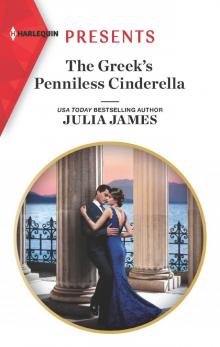 The Greek's Penniless Cinderella
The Greek's Penniless Cinderella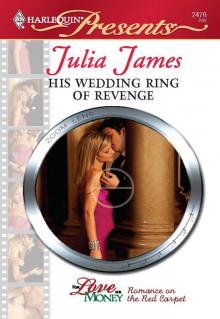 His Wedding Ring of Revenge
His Wedding Ring of Revenge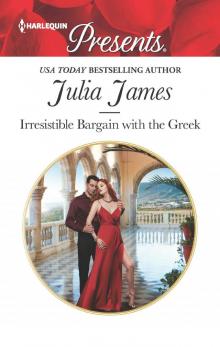 Irresistible Bargain with the Greek
Irresistible Bargain with the Greek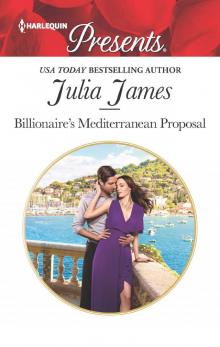 Billionaire's Mediterranean Proposal
Billionaire's Mediterranean Proposal The Dark Side of Desire
The Dark Side of Desire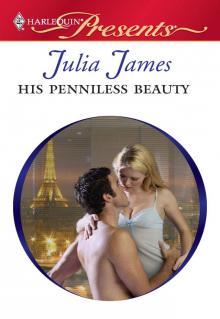 His Penniless Beauty
His Penniless Beauty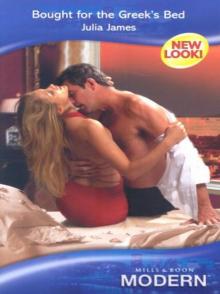 Bought ForThe Greek's Bed
Bought ForThe Greek's Bed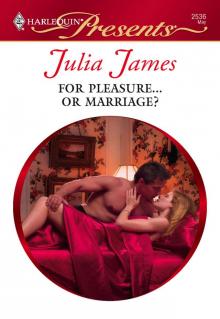 For Pleasure...Or Marriage?
For Pleasure...Or Marriage? Carrying His Scandalous Heir
Carrying His Scandalous Heir Captivated by the Greek
Captivated by the Greek The Mistress's Secret
The Mistress's Secret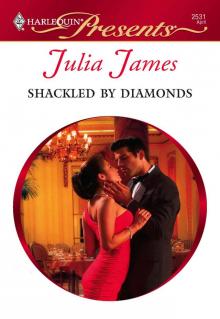 Shackled by Diamonds
Shackled by Diamonds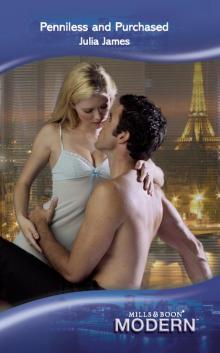 Penniless and Purchased
Penniless and Purchased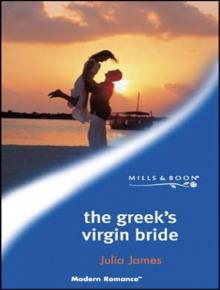 The Greek's Virgin Bride
The Greek's Virgin Bride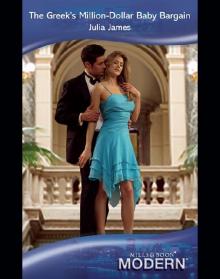 The Greek's Million-Dollar Baby Bargain
The Greek's Million-Dollar Baby Bargain Forbidden or For Bedding?
Forbidden or For Bedding?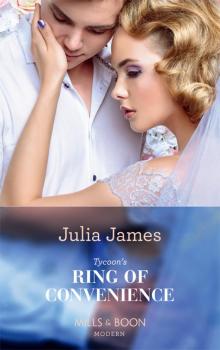 Tycoon's Ring of Convenience
Tycoon's Ring of Convenience Royally Bedded, Regally Wedded
Royally Bedded, Regally Wedded From Dirt to Diamonds
From Dirt to Diamonds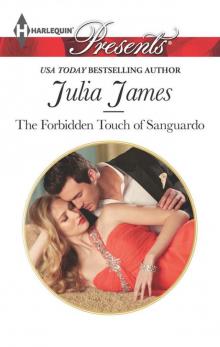 The Forbidden Touch of Sanguardo
The Forbidden Touch of Sanguardo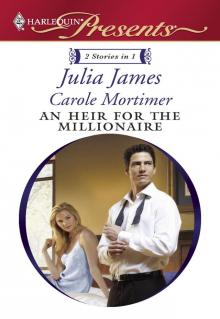 An Heir for the Millionaire
An Heir for the Millionaire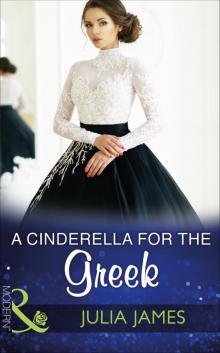 A Cinderella for the Greek
A Cinderella for the Greek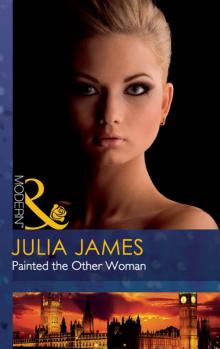 Painted the Other Woman
Painted the Other Woman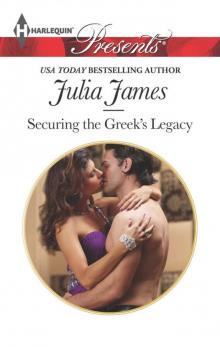 Securing the Greek's Legacy
Securing the Greek's Legacy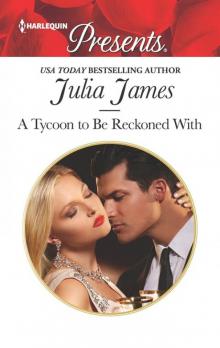 A Tycoon to Be Reckoned With (Harlequin Presents)
A Tycoon to Be Reckoned With (Harlequin Presents) Summer Sins
Summer Sins